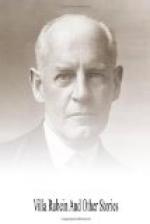“If there were no London office,” murmured Pippin, “the shareholders would get the same dividends.”
Hemmings gasped. “Come!” he said, “this is monstrous!”
“What help did I get from London when I first came here? What help have I ever had?”
Hemmings swayed, recovered, and with a forced smile replied that, if this were true, he had been standing on his head for years; he did not believe the attitude possible for such a length of time; personally he would have thought that he too had had a little something to say to the company’s position, but no matter...! His irony was crushing.... It was possible that Mr. Pippin hoped to reverse the existing laws of the universe with regard to limited companies; he would merely say that he must not begin with a company of which he (Hemmings) happened to be secretary. Mr. Scorrier had hinted at excuses; for his part, with the best intentions in the world, he had great difficulty in seeing them. He would go further —he did not see them! The explosion...! Pippin shrank so visibly that Hemmings seemed troubled by a suspicion that he had gone too far.
“We know,” he said, “that it was trying for you....”
“Trying!” “burst out Pippin.
“No one can say,” Hemmings resumed soothingly, “that we have not dealt liberally.” Pippin made a motion of the head. “We think we have a good superintendent; I go further, an excellent superintendent. What I say is: Let’s be pleasant! I am not making an unreasonable request!” He ended on a fitting note of jocularity; and, as if by consent, all three withdrew, each to his own room, without another word.
In the course of the next day Pippin said to Scorrier: “It seems I have been very wicked. I must try to do better”; and with a touch of bitter humour, “They are kind enough to think me a good superintendent, you see! After that I must try hard.”
Scorrier broke in: “No man could have done so much for them;” and, carried away by an impulse to put things absolutely straight, went on “But, after all, a letter now and then—what does it amount to?”
Pippin besieged him with a subtle glance. “You too?” he said—“I must indeed have been a wicked man!” and turned away.
Scorrier felt as if he had been guilty of brutality; sorry for Pippin, angry with himself; angry with Pippin, sorry for himself. He earnestly desired to see the back of Hemmings. The secretary gratified the wish a few days later, departing by steamer with ponderous expressions of regard and the assurance of his goodwill.
Pippin gave vent to no outburst of relief, maintaining a courteous silence, making only one allusion to his late guest, in answer to a remark of Scorrier:
“Ah! don’t tempt me! mustn’t speak behind his back.”
A month passed, and Scorrier still—remained Pippin’s guest. As each mail-day approached he experienced a queer suppressed excitement. On one of these occasions Pippin had withdrawn to his room; and when Scorrier went to fetch him to dinner he found him with his head leaning on his hands, amid a perfect fitter of torn paper. He looked up at Scorrier.




